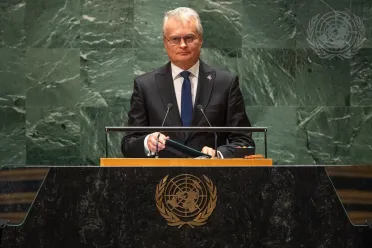Statement
Statement summary
GITANAS NAUSĖDA, President of Lithuania, called for Member States to rise to the challenges and work together to preserve peace, prosperity and stability, and save planet Earth from the effects of disastrous climate change. “I stand here to express my great concern about the devastating impact of climate change and to share the Lithuanian experience,” he said, calling for decisive actions to keep the Paris Agreement alive. Lithuania is committed to addressing climate change, aiming to achieve a 70 per cent reduction in greenhouse gas emissions by 2030 and become climate-neutral in in 2050, with the central role to be played by renewable energy. “There can be no sustainable development amidst a war,” he said, adding that the Russian Federation’s aggression against Ukraine aggravates the global situation with food and energy security, finance, climate, health and migration. “The international community can no longer allow Russia to manipulate and abuse global rules. Its numerous crimes, such as the wholesale destruction of Ukrainian cities and towns, murder of thousands of innocent civilians and displacement of millions, bring disgrace upon the UN Security Council, where Russia still sits as a permanent member with the power of veto,” he underscored, calling for putting more pressure on Moscow to stop deliberate attacks on Ukrainian civilians and civilian infrastructure.
He also said that the ecological catastrophe caused by the destruction of the Kakhovka Dam should not be replicated in more dangerous forms. “This war of aggression must stop, with an immediate, complete and unconditional withdrawal of troops and military equipment from Ukrainian territory. And what I mean here is all territory — within the internationally recognized borders and territorial waters of 1991,” he emphasized, adding that Lithuania strongly endorses Ukraine President Volodymyr Zelenskyy’s peace formula. He called on all Member States to provide substantial humanitarian, military, economic and diplomatic assistance to Ukraine, as well as to ensure the accountability of those responsible for war crimes and crimes against humanity. “While contemplating the issue of justice, we should also address the actions of the regime in Belarus which participates in this aggressive war by providing military assistance and facilitating the offensive from its territory,” he added, underlining the need to bring back Ukrainian children who were forcibly deported to the Russian Federation and Belarus. Mentioning the initiative to persecute sexual crimes perpetrated by Russian forces in Ukraine, he commended the unwavering dedication of the United Nations Special Representative on Sexual Violence in Conflict in addressing this critical issue. “What is still lacking is a tribunal specifically designed to prosecute the very crime of aggression committed by Russia’s top political and military leadership,” he said, calling for the establishment of such an international tribunal, supported by a General Assembly resolution.
He said that Russia is currently holding the world hostage, blocking Ukrainian grain exports, looting occupied Ukrainian territories and devastating local agricultural infrastructure. “Unilateral actions, such as Russia’s withdrawal from the Black Sea Initiative, endangering at least 82 countries and 350 million people currently on the food insecurity front line, should be universally condemned,” he said, stressing that the solution is not to lift sanctions on Moscow. He stated that Lithuania expects more active cooperation by the Russian Federation in protecting the Zaporizhzhia nuclear power plant according to the recommendations of the International Atomic Energy Agency (IAEA). Reminding that the Russian Federation broke the emerging consensus in the Non-Proliferation Treaty Review Conference and then Belarus announced agreement to deploy Russian nuclear weapons on its territory, he said that it means Moscow is preparing for more war. He called on the Assembly to condemn all kinds of aggression which clearly violate the Charter of the United Nations, adding: “However, to condemn is not enough. Decisive action must be taken. The politics of fear and coercion on a global scale must be stopped once and for all.”
Full statement
Read the full statement, in PDF format.
Photo

Previous sessions
Access the statements from previous sessions.
